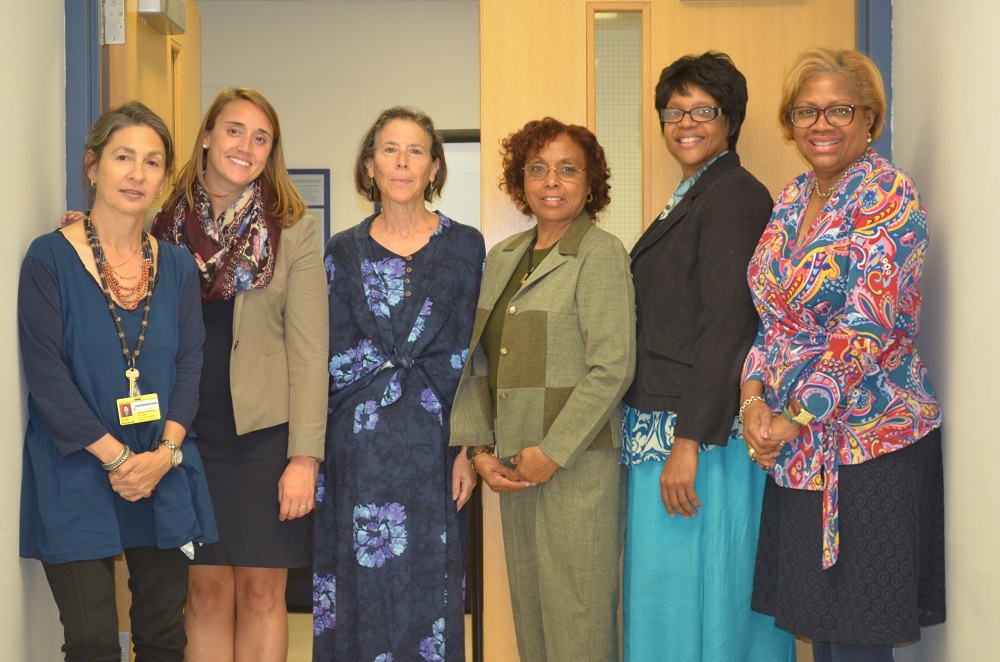Monthly Archives: October, 2017
MESSAGES FROM REBECCA SHLAFER, WARRIOR OF THE MINNESOTA PRISON DOULA PROJECT Heading link

Posted: October 12th, 2017
By: Amanda Wojan, MPH(c)
On September 27th Dr. Rebecca Shlafer, an Assistant Professor in the Division of General Pediatrics and Adolescent Health at the University of Minnesota, came to UIC to discuss her work implementing a prison doula project. Her lecture discussed the crucial nature of implementing policies that humanize incarcerated pregnant women throughout their pregnancy journeys. She discussed that prior to the implementation of this doula program in Minnesota, they lacked the resources and knowledge necessary to provide incarcerated pregnant women with what they needed to maintain their own health/the health of their babies. As Dr. Shlafer stated, the population of women in prison who are pregnant are a vulnerable group, potentially facing environmental risks, physical health issues, and issues related to mental health and substance misuse which in turn can lead to poor perinatal outcomes such as preterm and small for gestational age infants.1 Thus, focus on interventions that promote their health and well-being is of particular interest for public health professionals thinking in terms of lifecourse models. The long term health outcomes of these babies are dependent on both the prenatal and postnatal care that these women receive, as well as their ability to form important attachments with their babies early on.
The Minnesota Prison Doula Project implemented two core components into their programming: 1) a new moms informational group, and 2) one-on-one doula supports for all pregnant women in the prison. These components are meant to provide these mothers with the resources that they need to have a healthy and successful pregnancy, and to learn the skills necessary to form positive relationships with their babies. Dr. Shlafer mentioned that the doulas also provide emotional and social support to the woman post pregnancy when they are separated from their babies. They help the mothers establish healthy coping skills in this incredibly difficult separation process.
Doula support during childbirth is associated with better health outcomes for both the mother and the baby, including better APGAR scores, shorter first stage of labor, less medical interventions required during labor/delivery, and decreased c-sections.2 Doulas are not only helpful before, during, and directly after pregnancy, but they are also key players throughout the weeks postpartum in supporting the mother and baby in activities such as breastfeeding and forming healthy relationships. A key component of forming positive relationships between mother and baby is skin to skin contact. The benefits of skin to skin contact between mother and baby are invaluable: it helps to calm the baby by reducing stress levels in both mother and baby; it helps the mother’s milk to flow more easily; it boosts the baby’s immune system; it builds important neural connections in the baby’s brain via the smells, textures, and sounds that the baby experiences; it lowers the mother’s risk of a postpartum mood disorder; and ultimately it creates lasting connections and strong attachments between the mother and baby.3
This seemingly simple concept is something that can prove extremely challenging for women in prison. Many do not have access to their babies postpartum, as they are entered back into prison after their 48 hour stay in the hospital. This leaves them only their occasional visitations with family to have any human contact with their babies. This crucial issue proposes important next steps for groups that work with these vulnerable women. The implementation of doulas in state prisons is extremely beneficial, and the data show that it improves birthing outcomes. But what comes next? How can we support new mothers who are still in prison to have successful and positive relationships with their newborns? This falls heavily on policy, advocacy, and compassion stemming from the multidisciplinary team that works to promote the health outcomes of these women and children. Our work here is not done and this is of importance considering over the last two decades the number of women in prison in the US has dramatically increased and approximately 76% of incarcerated women are of childbearing age.4
Which leads me to a powerful quote from Dr. Shlafer’s presentation: “Research without advocacy is just a dusty journal on someone’s shelf. Advocacy without research is just a temper tantrum.”5
References:
1 Shlafer, R. J., Hellerstedt, W. L., Secor-Turner, M., Gerrity, E. and Baker, R. (2015), Doulas’ Perspectives about Providing Support to Incarcerated Women: A Feasibility Study. Public Health Nurs, 32: 316–326. doi:10.1111/phn.12137
2 BOlBOl-haGhiGhi, N., MaSOuMi, S. Z., & KaZeMi, F. (2016). Effect of Continued Support of Midwifery Students in Labour on the Childbirth and Labour Consequences: A Randomized Controlled Clinical Trial. Journal of clinical and diagnostic research: JCDR, 10(9), QC14.
3 Breastmilk, Every Ounce Counts. Retrieved from http://www.breastmilkcounts.com/breastfeeding-101/skin-to-skin/
4 Shlafer, R. J., Hellerstedt, W. L., Secor-Turner, M., Gerrity, E. and Baker, R. (2015), Doulas’ Perspectives about Providing Support to Incarcerated Women: A Feasibility Study. Public Health Nurs, 32: 316–326. doi:10.1111/phn.12137
5 Shlafer, R. (2017). Pregnant and parenting among incarcerated women: from research to advocacy. [PowerPoint slides]. Retrieved on September 27 2017.